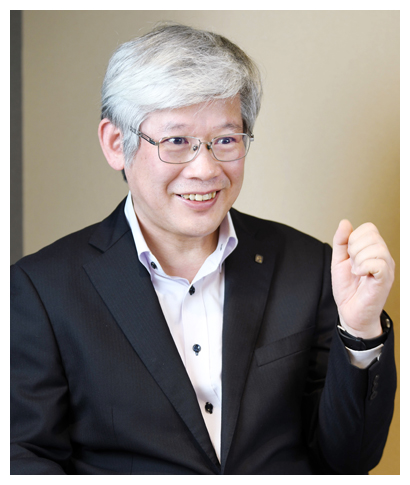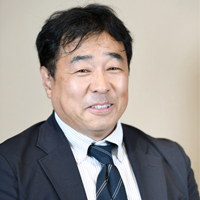To leverage RIKEN's comprehensive capabilities and to conduct more effective management with a stronger strategic focus, a new system was introduced in fiscal year 2025. It consists of five research domains-Pioneering Science; Mathematical, Computational and Information Science; Life Science; Sustainable Science; and Physical Science. Each research domain is led by an Executive Director of Science, an internationally outstanding scientist who possesses extremely high expertise both academically and in research management. These Executive Directors of Science encourage cross-disciplinary collaboration based on advanced specialized knowledge, accelerating the creation of new knowledge. Supporting research promotion alongside the five Executive Directors of Science are the Promotion Division Directors.
We asked about the goals of each domain from both researchers' and administrative departments' perspectives.
- Mathematical, Computational and Information Science Domain
- This domain aims to organically connect researchers in different fields and create the computational infrastructure and fundamental principles needed for the promotion of future science, technology and social change.

Tetsuo Hatsuda
Executive Director of Science, Mathematical, Computational and Information Science Domain
Before taking my position as Chief Scientist at the RIKEN Nishina Center for Accelerator- Based Science in 2012, I taught at various universities, including the University of Tokyo. As a university faculty member, opportunities for cross-disciplinary discussions about science were limited due to the constraints inherent in academic departments.
However, the classification of natural sciences, humanities, and social sciences into separate disciplines is ultimately a matter of human convenience; in essence, there should be no clear boundaries in academia. In this regard, RIKEN-where research is placed at the core and where researchers from a wide range of fields gather-provides fertile ground for natural cross-disciplinary exchanges. It is also home to many world-leading researchers. Furthermore, in order to support large-scale computation and data analysis, RIKEN has established cutting-edge research infrastructure such as the supercomputer Fugaku and the quantum computer A.
Amidst the transformation of traditional academic frameworks, the Mathematical, Computational, and Information Sciences Domain, which comprises over 1,000 internationally diverse researchers, is working to build a computational and information foundation that can support all fields of science and technology. At the same time, it aims to foster the creation of new and innovative fundamental theories through collaboration with academia and industry.
Forstering a fertile ground for transcending disciplinary boundaries
In this domain, four research centers and the RIKEN Information R&D and Strategy Headquarters (R-IH) are working in cooperation to promote the integration and convergence of mathematical, computational, and information sciences. Their collective efforts are driving the creation of new foundational theories, significantly expanding the scope of the computable domain, and accelerating the application of AI technologies to scientific research-an initiative known as "AI for Science". By extending these advances to other research fields, the ultimate aim is to contribute to the dramatic advancement of scientific discovery.
The RIKEN Center for Interdisciplinary Theoretical and Mathematical Sciences (iTHEMS) is a globally unique organization where young researchers from diverse fields-including mathematics, physics, chemistry, life sciences, computational science, and information science-gather "under one roof" to engage in open and interdisciplinary dialogue. The center also applies mathematical perspectives to the humanities and social sciences, while fostering the next generation of mathematical talent through collaborations with universities and research institutions in Japan and abroad.
At the RIKEN Center for Computational Science (R-CCS), the world-class supercomputer Fugaku is being utilized across a wide array of research domains. The center operates in a trinity of supercomputing, quantum computing, and AI, aiming to realize "science of computation, by computation, and for computation." Through this approach, R-CCS is laying the groundwork for AI for Science, seeking to give rise to new scientific disciplines from within existing ones.
The RIKEN Center for Quantum Computing (RQC) is conducting foundational research to develop and enhance the performance of quantum computers based on various architectures. By integrating these efforts with computational science and electronics technologies, the center is working toward establishing next-generation quantum computing technologies. It also serves as a core hub for quantum technology innovation in Japan, conducting collaborative research with universities, research institutions, and industries both domestically and internationally.
The RIKEN Center for Advanced Intelligence Project (AIP) is pursuing cutting-edge research in machine learning and optimization, aiming to gain an understanding of their underlying principles and develop foundational technologies for safe and trustworthy AI that can be applied universally in real-world settings. In addition to promoting practical applications that address societal issues and accelerate scientific research, AIP also actively tackles social challenges such as AI safety, ethics, and governance.
Fully respecting the individuality of each researcher
Looking back at the history of science, many unexpected discoveries and groundbreaking technologies have emerged as researchers pursued their own intellectual curiosity. We believe that it is the mission of this research field to carefully nurture the seeds of new science that grow in a free research environment- one that fully respects individual uniqueness-and to connect those seeds to a better future for humanity and the planet.

Hirotaka Shibata
Division Director, Mathematical, Computational and Information Science Promotion Division
Going forward, we will strive to ensure that the research outcomes generated in this domain contribute tangibly to solving societal challenges, through a united effort in which researchers and administrative departments function as two wheels of the same cart. To achieve this, we will further strengthen and deepen the collaboration among administrative teams more than ever before.
Rate this article
Stars





Thank you!
Submit






